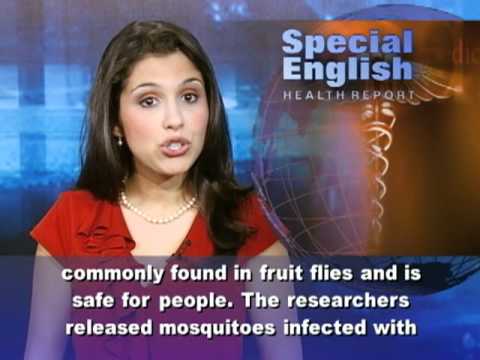Trying a New Way to Stop Dengue
 |
This is the VOA Special English Health Report, from voaspecialenglish.com | facebook.com/voalearningenglish
Dengue fever feels like a severe case of the flu, including pain in the muscles and joints. The World Health Organization says there may be fifty million dengue infections every year. Deaths are rare, fewer than thirteen thousand a year. But dengue has spread sharply since the nineteen seventies. The disease is found mostly in cities. The WHO says forty percent of the world's population is now at risk in more than one hundred countries. Southeast Asia and the Western Pacific are the most affected. Dengue is also found in Africa, the Americas and the eastern Mediterranean. There is no vaccine against dengue and no special treatment. Scott Ritchie of James Cook University in Queensland, Australia, says control efforts target the mosquitoes that spread dengue. He says the only way to control it is through the use of pesticides chemicals and perhaps community education. But some mosquitoes are getting resistant to those pesticides. He and other scientists from Australia and the United States are working on a different plan of attack. They blocked the growth of dengue virus in mosquitoes by infecting them with a kind of bacteria called Wolbachia pipientis. Wolbachia is commonly found in fruit flies and is safe for people. The researchers released mosquitoes infected with Wolbachia into an indoor test area filled with uninfected mosquitoes. The infected ones mated with the uninfected ones and successfully spread the bacteria. The researchers then tried their experiment outdoors. Over a two-month period they released more than three hundred thousand infected mosquitoes in two Australian towns.Scott O'Neill at Monash University in Melbourne says the mosquitoes quickly infected wild populations just as they had in the indoor test. Once the release has stopped, the Wolbachia continued to increase until the experiments ended. Next, the plan is to do tests over the next two to three years in an area where many people are infected with dengue. The researchers described their work in two papers published in the journal Nature.Mosquitoes also spread malaria. The kind of mosquito that injects the malaria parasite into the people it bites is most active around sunset and sunrise. So bed nets can help protect people while they sleep. But the mosquito that spreads dengue, Aedes aegypti, is most active during the day.For VOA Special English, I'm , I'm Alex Villarreal.
(Adapted from a radio program broadcast 31Aug2011)
|




